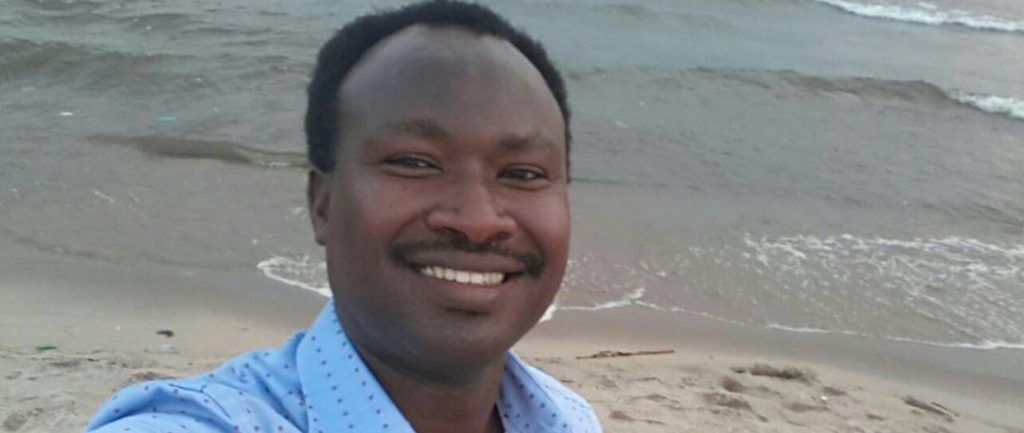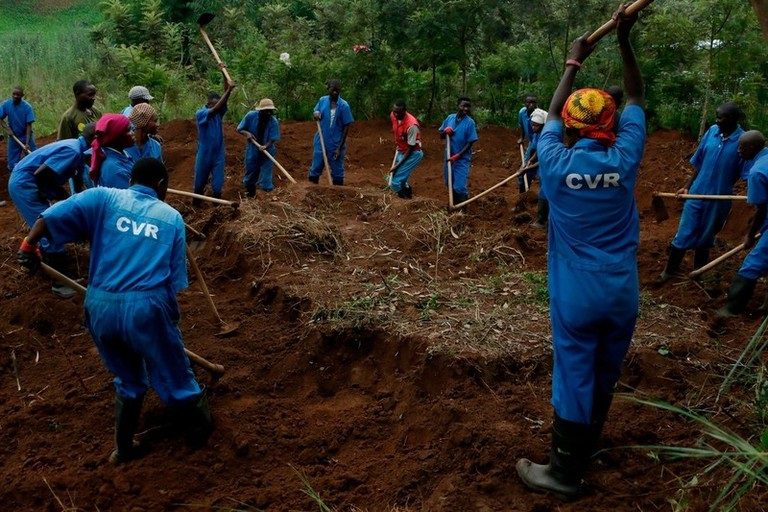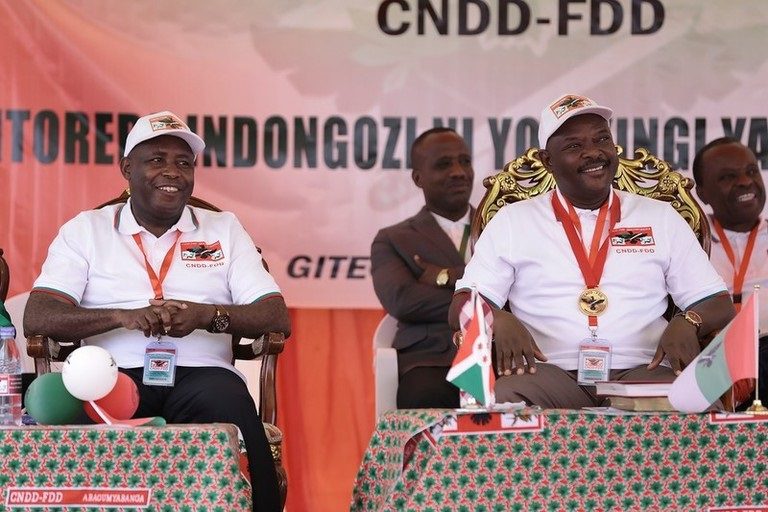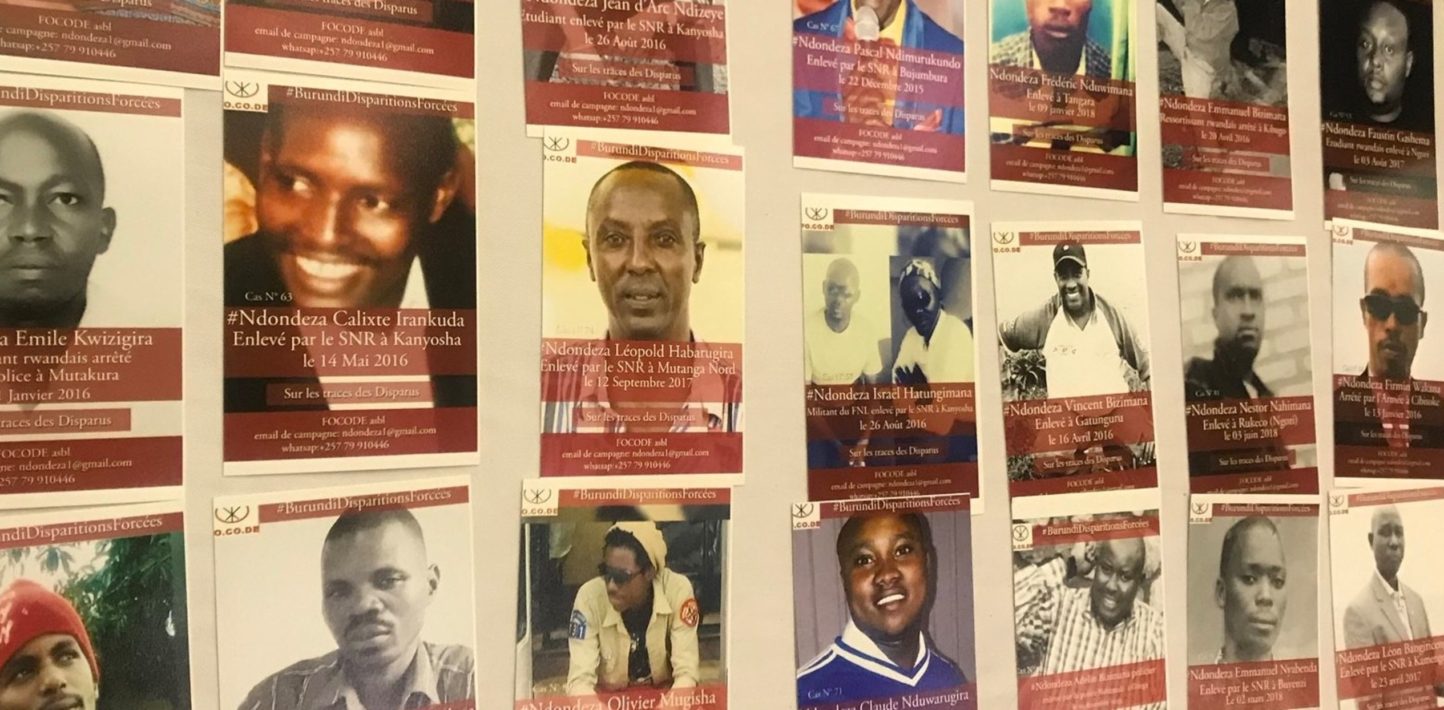Burundi’s new government, under the leadership of President Evariste Ndayishimiye, was sworn into office sooner than expected, following the sudden death of the outgoing President Pierre Nkurunziza in June. The last five years were characterized by a rapid deterioration of respect for human rights. Amnesty International recommends that the Government of Burundi addresses the following 10 priority areas to improve the country’s human rights situation.
- End impunity for human rights violations
The past five years have been marked by an increase in serious human rights violations including extrajudicial executions, enforced disappearances, arbitrary arrests and detention, torture and cruel, inhuman and degrading treatment. These have been carried out primarily by the police, National Intelligence Service (SNR) and the ruling party’s youth wing, Imbonerakure. To turn the page, the new government should end impunity by holding perpetrators of such violations to account. In October 2019, four Imbonerakure members were convicted in Muyinga for killing a member of the opposition party, the National Congress for Freedom (CNL). Delivering justice as in this case should become the new normal in Burundi.
In his inauguration speech, President Ndayishimiye said “all those who commit crimes, whether government members or other dignitaries, must be brought before the competent jurisdictions. All crimes must be punished to avoid falling into the same mistakes as in the past.” He also promised reform of the justice sector. His government should ensure prompt, impartial, independent and effective investigations are conducted into human rights violations and abuses. Members of security forces suspected of responsibility for such violations, and any officials who ordered or condoned such crimes, should be suspended pending investigations and where there is sufficient admissible evidence, those suspected of criminal responsibility should be prosecuted in fair trials.
- Demobilise the Imbonerakure
The Imbonerakure, the youth wing of the ruling party the National Council for the Defence of Democracy – Forces for the Defence of Democracy (CNDD-FDD), play a variety of roles, some of which are traditional political activities. Imbonerakure groups have intimidated and attacked members of opposition political parties, threatening and inflicting violence on people who refuse to join the ruling party. Most Burundian refugees interviewed by Amnesty International since 2016 said they fled due to insecurity caused by the Imbonerakure.
Since 2014, Imbonerakure have also been part of mixed security committees at the local level. They frequently work on behalf of and alongside the police and the National Intelligence Service (SNR) in carrying out often arbitrary arrests and other human rights violations and abuses. It is not appropriate for a political group to play an active role in security matters, reinforcing or even replacing the traditional security services. The Imbonerakure should have no further involvement in security-related matters. The ruling party should also promptly end the youth wing’s widespread use of violence, harassment and intimidation against their real and suspected opponents. Anyone arming the Imbonerakure or ordering activities that amount to human rights violations and abuses should be held to account.
- Reveal the fate of victims of enforced disappearances

The increase of enforced disappearances since 2015 has been particularly chilling. Marie-Claudette Kwizera, a human rights defender working with Ligue Iteka, was abducted in Bujumbura in December 2015. The UN Commission of Inquiry on Burundi said they had credible information she was killed a few days after her disappearance, having first been taken to the SNR offices. Journalist Jean Bigirimana was reportedly arrested by SNR officers in Bugarama, Muramvya province, on 22 July 2016. Despite investigations by his employer Iwacu Press Group, the police and the National Independent Human Rights Commission (CNIDH), he has never been found.
The new government must end enforced disappearances immediately, fully investigate and, where possible, prosecute perpetrators of enforced disappearances and tell families the truth about the fate of their loved ones. The government should also ratify and implement the International Convention for the Protection of All Persons from Enforced Disappearance. Burundi signed the Convention in 2007.
- Release prisoners of conscience

Several human rights defenders and journalists were arrested and convicted as part of a crackdown on civil society and journalists. Germain Rukuki, a former employee of the anti-torture organization Action by Christians for the Abolition of Torture (ACAT-Burundi), was arrested in July 2017. On 26 April 2018, he was convicted on charges including threatening state security and sentenced to 32 years in prison. Similarly, Nestor Nibitanga was convicted in August 2018 for “threatening state security” and sentenced to five years in prison, after he was found guilty of compiling reports for the Association for the Protection of Human Rights and Detained Persons (APRODH) after the government had closed the organization – an accusation he refutes.
In October 2019, journalists of the Iwacu Press Group Agnès Ndirubusa, Christine Kamikazi, Egide Harerimana and Térence Mpozenzi were arrested with their driver Adolphe Masabarakiza on their way to report on clashes between the security forces and an armed group in Bubanza province. Adolphe Masabarakiza was acquitted but the four journalists were sentenced to two and a half years in prison and each fined one million Burundian francs (approximately 525 USD) for an “impossible attempt” to threaten internal state security.
Amnesty International considers all six to be prisoners of conscience, convicted and sentenced solely on account of their peaceful exercise of their human rights. They should be immediately and unconditionally released.
- Prioritize progress on women’s rights
Five of out 16 of the new government ministers are women, upholding the 30% requirement laid out in Burundi’s constitution. This is a similar proportion to the previous government. Amnesty International encourages the government to go beyond representation to strengthening promotion and respect for women’s rights as a priority because discriminatory measures have been imposed on women and girls in recent years.
The UN Commission of Inquiry on Burundi has documented numerous cases of sexual violence, primarily against women, but also against girls and men. They found that most of the attacks were committed by state actors or the Imbonerakure. Rape, particularly gang rape, was used to intimidate or punish victims for their perceived political views, or those of their husbands or other male family members.
- Create a safe environment for refugee returns
President Ndayishimiye in his inauguration speech on 18 June called on Burundians who had fled the country and wanted to come back home to return. While refugee returns have been organized from Tanzania since 2017, Burundians continued to leave the country at a steady rate due to a climate of fear in the country. For returns to be truly voluntary, in line with international law, refugees should not feel compelled to return on account of intimidating messages from government officials or because basic services are withdrawn in the camps. Some who returned to Burundi faced difficulties reintegrating due to insufficient support. Others were accused of supporting the opposition and threatened or physically attacked by the Imbonerakure. The new government should ensure that returning refugees do not face reprisals and are able to access services.
The new government must demonstrate that it is tackling the issues that pushed people into exile in the first place such as abuses by the Imbonerakure and continued targeting of civil society. In February 2020, the Supreme Court held a hearing in the trial of 12 human rights defenders and journalists accused of “insurrection” who, due to their role in opposing President Nkurunziza’s third term, were accused of involvement in the failed coup attempt of May 2015. None of the accused were present as they were all in exile.
- Promote effective dialogue
President Ndayishimiye has also emphasized the importance of dialogue in Burundian tradition and encouraged all Burundians to exercise their right to freedom of expression. In the same breath, he challenged political parties; “if they are not speaking the same language as the elected government, what other government do they claim?” He also accused some human rights defenders of working on behalf of the “colonists”.
If the new government is serious about human rights, then they must send a clear, unambiguous message through their words and actions that the right to freedom of expression will be fully and effectively respected, protected, promoted and fulfilled in Burundi. It should also be clear that all acts of intimidation, repression and violence against those who disagree with the ruling party will not be tolerated.

- Work towards truth and justice
Burundi’s Truth and Reconciliation Commission (TRC) was established in 2014 to investigate and establish the truth about grave violations of human rights and international humanitarian law committed in the period 1962 to 2008, later extended back to 1885. The government should reconsider establishing a judicial mechanism, such as the Special Tribunal discussed during the negotiations on Burundi’s transitional justice mechanisms, which could contribute to ending impunity for past atrocities.
Since the start of 2020, the TRC has been conducting regular and highly publicized exhumations of mass graves, predominantly related to the 1972 massacres. The exhumations and the commentary on them by public officials had been perceived as an attempt to impose a single narrative and to manipulate public sentiment in the run-up to the elections. The process, as conducted, risks retraumatizing family members of victims and others who lived through the atrocities. The government should guard against all political manipulation of the TRC.
On a practical level, the exhumations have not been conducted in a way that would preserve evidence from the graves. They should be put on hold until proper guidelines are in place to exhume further graves with dignity and to the necessary forensic standards, as well as for respectful storage of the human remains exhumed. Communities and families should be urgently consulted on their wishes for the treatment and eventual reburial of their loved ones’ remains.
- Guarantee the right to health

President Ndayishimiye’s announcement of new measures to tackle COVID-19 on 30 June marked a welcome change in direction in the government’s response to the pandemic. Declaring the disease as “Burundi’s worst enemy”, he announced an increase in mass testing. On 20 July, the International Monetary Fund (IMF) announced the approval of debt service relief to Burundi that was expected to “free up public resources to help address the pandemic.”
Going forward, the government must take care not to stigmatize people with COVID-19. On 30 June, President Ndayishimiye said people who displayed COVID-19 like symptoms but refused to be tested would be “considered a sorcerer and treated as severely as one would be.” Considering that people accused of practicing witchcraft in the country have been targeted by mob violence, Amnesty International calls on President Ndayishimiye to urgently make it clear that the government would not condone such acts.
The government should ensure that adequate measures are taken to protect the population from avoidable exposure to COVID-19 and ensure such measures are within the law and respect human rights. The government should enable rather than hinder efforts by people in Burundi to safeguard personal and public health. In March 2020, the government spokesperson warned that institutions taking proactive protective measures against COVID-19 (such as closing schools) would face sanctions because their actions were “getting ahead of the government” and intended to “manipulate or disorientate public opinion”. This statement risks deterring people from taking proactive measures to benefit public health.
- Restart international engagement
President Ndayishimiye has also spoken of the need to improve Burundi’s image abroad on the basis of mutual respect, complementarity and strengthened understanding, while also warning “certain countries and organizations” that try to impose “demands that go against Burundians’ ancestral culture”. Relations between Burundi and many countries have been strained since the start of the political crisis in 2015. In 2016, the European Union suspended direct financial assistance to the Burundian government.
The former government cut off almost all international engagement on human rights issues, including closing the UN human rights office in the country, although the African Union maintained a team of human rights monitors in Burundi. In 2018, the three members of the Commission on Inquiry on Burundi mandated by the Human Rights Council (HRC) were declared persona non grata. In addition to documenting and reporting, the Commission is mandated to dialogue with the government to provide support and advice in order to improve the human rights situation in the country and to combat impunity. Amnesty International urges the new government to re-engage with international and regional human rights mechanisms. More broadly, reviving international engagement and cooperation should reopen important avenues of financial and technical support in working towards the progressive realization of social and economic rights in Burundi.
The detailed human rights agenda can be found here.


